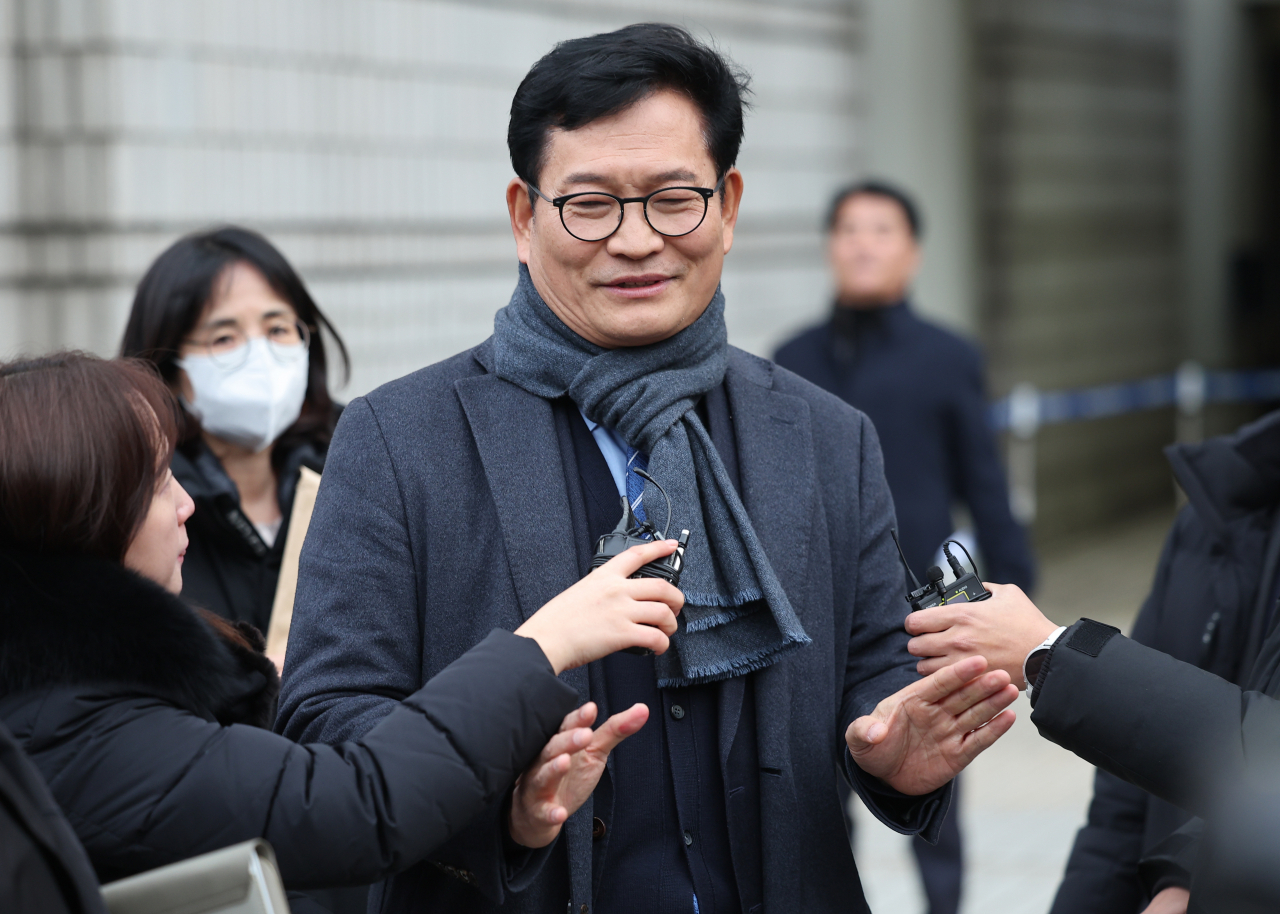 |
Song Young-gil, former leader of the Democratic Party of Korea, leaves the Seoul Central District Court after a hearing held on Monday. (Yonhap) |
A Seoul court’s decision to issue an arrest warrant for Song Young-gil, ex-leader of the main opposition Democratic Party of Korea, could pose some risks for the liberal bloc ahead of next year’s general election, observers said Tuesday.
The Seoul Central District Court on late Monday granted the warrant sought by prosecutors against Song on charges of bribing several of his fellow Democratic Party lawmakers in the time frame leading up to the party’s leadership election in May 2021. Song was elected party leader at the convention by a narrow 0.59 percentage point.
Prosecutors claimed that Song and his aides distributed some 66 million won ($50,613) in cash to various Democratic Party lawmakers. The cash was suspected to have been funneled through illegal political funds received by businessmen and lawmakers.
In addition, Song has been accused of accepting a separate illegal political fund worth a total of 763 million won through his support group, the Research Institute for Peace & Livelihood. Of the 763 million won, some 40 million won are suspected of being linked to an incineration facility building project in Yeosu, South Jeolla Province.
Overall, Song accepted a total of 820 million won in illegal political funds between 2020 and 2021, prosecutors claimed.
Song has been denying the allegations, calling them "a politically orchestrated investigation" by prosecutors.
Despite Song’s claim, the Seoul court’s latest decision will likely rattle the Democratic Party ahead of the April general election next year.
Observers say that the latest case could undermine voters’ trust in the main opposition party ahead of next year's election with both the ex-leader and the current head of the Democratic Party mired in separate corruption scandals.
It is likely to spark separate investigations into 21 other Democratic Party lawmakers accused of being involved in Song’s bribery case, they said.
Song's arrest follows prosecutors' decision earlier this year to indict current Democratic Party leader Lee Jae-myung, without physical detention, over corruption charges. Lee has been accused of breach of trust, bribery and a slew of other charges from his time as the mayor of Seongnam in Gyeonggi Province from 2014 to 2018.
"If this leads to an investigation into some 20 incumbent lawmakers accused of being involved in Song's bribery case, it will work as a hurdle in the upcoming general election," Democratic Party Rep. Cho Eung-cheon said in a Tuesday radio interview.
Cho, who has vocally criticized Lee's monopolization of power within the main opposition party, also expressed concerns that Song's arrest could empower the ruling People Power Party to push for other agendas within the National Assembly.
People Power Party Rep. Yun Jae-ok criticized the arrested ex-opposition party leader on Tuesday, saying that “Song has continuously denied the allegations against him despite existing voice recordings."
“He has brushed off the notion of 'distributing money envelopes,' saying that it's not a major crime because it happened at an internal party event," he added.
Song’s arrest has further heightened the hurdle for the progressive bloc in the upcoming election on top of the recent announcement by former leader of the Democratic Party of Korea and ex-Prime Minister Lee Nak-yon saying he will establish a new political party. The announcement had sent jitters across the main opposition party on the news of a new potential rival.
Lee, an influential lawmaker, said in a recent TV interview that he envisions a party that could become No. 1 in the National Assembly with an independent spirit. His new party would not align its goals or join forces with the ruling People Power Party or the Democratic Party, Lee said.
The former prime minister has previously cited current Democratic Party leader Lee Jae-myung's excessive clout within the main opposition party as a key reason behind his lack of support for his former party.






![[Today’s K-pop] Blackpink’s Jennie, Lisa invited to Coachella as solo acts](http://res.heraldm.com/phpwas/restmb_idxmake.php?idx=644&simg=/content/image/2024/11/21/20241121050099_0.jpg)
